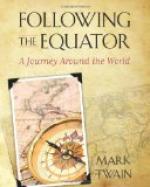The coat of wool was unbelievably thick. Before the shearing the sheep looked like the fat woman in the circus; after it he looked like a bench. He was clipped to the skin; and smoothly and uniformly. The fleece comes from him all in one piece and has the spread of a blanket.
The college was flying the Australian flag—the gridiron of England smuggled up in the northwest corner of a big red field that had the random stars of the Southern Cross wandering around over it.
From Horsham we went to Stawell. By rail. Still in the colony of Victoria. Stawell is in the gold-mining country. In the bank-safe was half a peck of surface-gold—gold dust, grain gold; rich; pure in fact, and pleasant to sift through one’s fingers; and would be pleasanter if it would stick. And there were a couple of gold bricks, very heavy to handle, and worth $7,500 a piece. They were from a very valuable quartz mine; a lady owns two-thirds of it; she has an income of $75,000 a month from it, and is able to keep house.
The Stawell region is not productive of gold only; it has great vineyards, and produces exceptionally fine wines. One of these vineyards—the Great Western, owned by Mr. Irving—is regarded as a model. Its product has reputation abroad. It yields a choice champagne and a fine claret, and its hock took a prize in France two or three years ago. The champagne is kept in a maze of passages under ground, cut in the rock, to secure it an even temperature during the three-year term required to perfect it. In those vaults I saw 120,000 bottles of champagne. The colony of Victoria has a population of 1,000,000, and those people are said to drink 25,000,000 bottles of champagne per year. The dryest community on the earth. The government has lately reduced the duty upon foreign wines. That is one of the unkindnesses of Protection. A man invests years of work and a vast sum of money in a worthy enterprise, upon the faith of existing laws; then the law is changed, and the man is robbed by his own government.
On the way back to Stawell we had a chance to see a group of boulders called the Three Sisters—a curiosity oddly located; for it was upon high ground, with the land sloping away from it, and no height above it from whence the boulders could have rolled down. Relics of an early ice-drift, perhaps. They are noble boulders. One of them has the size and smoothness and plump sphericity of a balloon of the biggest pattern.
The road led through a forest of great gum-trees, lean and scraggy and sorrowful. The road was cream-white—a clayey kind of earth, apparently. Along it toiled occasional freight wagons, drawn by long double files of oxen. Those wagons were going a journey of two hundred miles, I was told, and were running a successful opposition to the railway! The railways are owned and run by the government.




